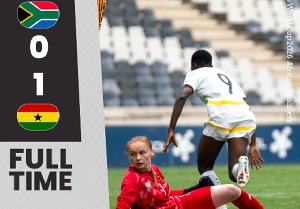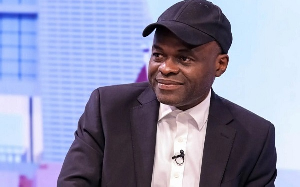THE WORLD Bank's incoming Country Director, Mr. Mats Karlsson, may be walking his way in the corridors of the conference room at the ongoing World Summit in Johannesburg with a mission to lead the fight of impressing upon developed countries to honour their pledges towards developing countries.
This is due to the pressure being exerted on the bank to reform its policies for developing countries, which appears to be on a try-and-error basis.
Even though, he is yet to be firmly seated in the country after taking over from his predecessor, Mr. Peter Harold, Karlsson yesterday tasted the acrimony facing the kind of policies his institution has been pushing on developing countries since 1988, which have caused severe harm to the ordinary citizens.
This became evidence at the Ghana launch of the world development report of 2003 in Accra.
In an interview, former Deputy Minister for Finance, Hon. Moses Asaga, asked for proof of the benefits of the Highly Indebted Poor Countries (HIPC) Initiative that were promised to countries that made them opt for that initiative.
Other World Bank's programmes attacked were its mining policies for developing countries, which have resulted in pollution of water bodies', poverty reduction strategy, and the allocation of funds to Africa vis-a-vis its European counterparts.
The World Bank has been highly criticized on numerous occasions for its structural adjustment policy, and the agricultural program introduced in the early 1980s, which experts say has left lots of children in Africa malnourished.
Despite these criticisms, Karlsson, who is also the Vice President of the External Affairs of the World Bank, counted that though the bank recommends policies to developing countries, it is governments in those countries who are the key players in the implementation and are therefore responsible for the success or otherwise of those policies.
Admitting that there have been some difficulties in implementing those policies, he said, "We cannot do more to convince but can do more to help".
But the Okyenhene, Osagyefuo Amoatia Ofori Panin, pointed out that it was unnecessary for the World Bank to sit and shift blames when, in effect, the present situation is as a result of some of their own policies.
"I don't understand any advancement in the global economy that leaves 3.5 billion people behind", he said and went on "and worst to count 1.5 billion children who go to bed without drinking a clean glass of water", the Okyenhene asserted.
"We were told let mining companies to come in and that they were going to give us economic benefits, but we have messed up our water bodies today and people are drinking from polythene bags, which are choking our gutters." He said.
The Okyenhene therefore charged developing countries to assume responsibility for the destruction that have been caused to our countries, saying, "the people who came to our countries to exploit us have their own problems."
General News of Saturday, 31 August 2002
Source:
World Bank Programmes Under Attack
Entertainment











